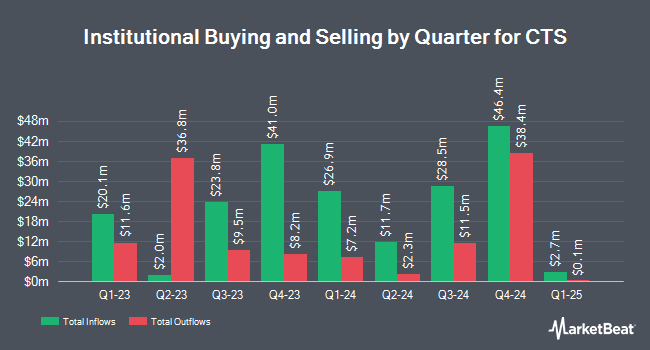Gamco Investors INC. ET AL decreased its holdings in shares of CTS Co. (NYSE:CTS - Free Report) by 3.9% in the 4th quarter, according to its most recent Form 13F filing with the Securities and Exchange Commission. The institutional investor owned 1,267,107 shares of the electronics maker's stock after selling 51,629 shares during the quarter. CTS accounts for approximately 0.7% of Gamco Investors INC. ET AL's portfolio, making the stock its 23rd largest position. Gamco Investors INC. ET AL owned about 4.21% of CTS worth $66,815,000 as of its most recent SEC filing.
A number of other hedge funds and other institutional investors have also bought and sold shares of the stock. Smartleaf Asset Management LLC grew its stake in shares of CTS by 608.7% in the fourth quarter. Smartleaf Asset Management LLC now owns 737 shares of the electronics maker's stock worth $39,000 after purchasing an additional 633 shares during the last quarter. KBC Group NV lifted its stake in CTS by 58.2% in the fourth quarter. KBC Group NV now owns 1,713 shares of the electronics maker's stock worth $90,000 after acquiring an additional 630 shares during the period. Envestnet Portfolio Solutions Inc. bought a new stake in CTS in the fourth quarter valued at $202,000. Atria Wealth Solutions Inc. bought a new position in CTS in the fourth quarter worth about $214,000. Finally, Corient Private Wealth LLC purchased a new position in shares of CTS in the fourth quarter worth $214,000. Hedge funds and other institutional investors own 96.87% of the company's stock.
Analysts Set New Price Targets
Separately, StockNews.com raised shares of CTS from a "hold" rating to a "buy" rating in a report on Monday, March 3rd.
View Our Latest Report on CTS
CTS Price Performance
NYSE:CTS traded up $0.70 on Friday, reaching $37.49. 200,183 shares of the company's stock traded hands, compared to its average volume of 156,389. The company has a quick ratio of 1.95, a current ratio of 2.50 and a debt-to-equity ratio of 0.17. CTS Co. has a 12 month low of $34.02 and a 12 month high of $59.68. The stock has a 50-day simple moving average of $42.03 and a 200-day simple moving average of $48.50. The firm has a market cap of $1.13 billion, a PE ratio of 19.73 and a beta of 0.61.
CTS (NYSE:CTS - Get Free Report) last released its quarterly earnings results on Tuesday, February 4th. The electronics maker reported $0.53 earnings per share (EPS) for the quarter, missing analysts' consensus estimates of $0.59 by ($0.06). CTS had a net margin of 11.27% and a return on equity of 12.67%. Equities research analysts forecast that CTS Co. will post 2.28 earnings per share for the current year.
CTS Dividend Announcement
The firm also recently announced a quarterly dividend, which will be paid on Friday, April 25th. Stockholders of record on Friday, March 28th will be paid a dividend of $0.04 per share. The ex-dividend date is Friday, March 28th. This represents a $0.16 dividend on an annualized basis and a dividend yield of 0.43%. CTS's dividend payout ratio is 8.42%.
About CTS
(
Free Report)
CTS Corporation manufactures and sells sensors, actuators, and connectivity components in North America, Europe, and Asia. The company provides encoders, rotary position sensors, slide potentiometers, industrial and commercial rotary potentiometers. It also provides non-contacting, and contacting pedals; and eBrake pedals.
Featured Articles

Before you consider CTS, you'll want to hear this.
MarketBeat keeps track of Wall Street's top-rated and best performing research analysts and the stocks they recommend to their clients on a daily basis. MarketBeat has identified the five stocks that top analysts are quietly whispering to their clients to buy now before the broader market catches on... and CTS wasn't on the list.
While CTS currently has a Hold rating among analysts, top-rated analysts believe these five stocks are better buys.
View The Five Stocks Here
Discover the 10 Best High-Yield Dividend Stocks for 2025 and secure reliable income in uncertain markets. Download the report now to identify top dividend payers and avoid common yield traps.
Get This Free Report
Like this article? Share it with a colleague.
Link copied to clipboard.